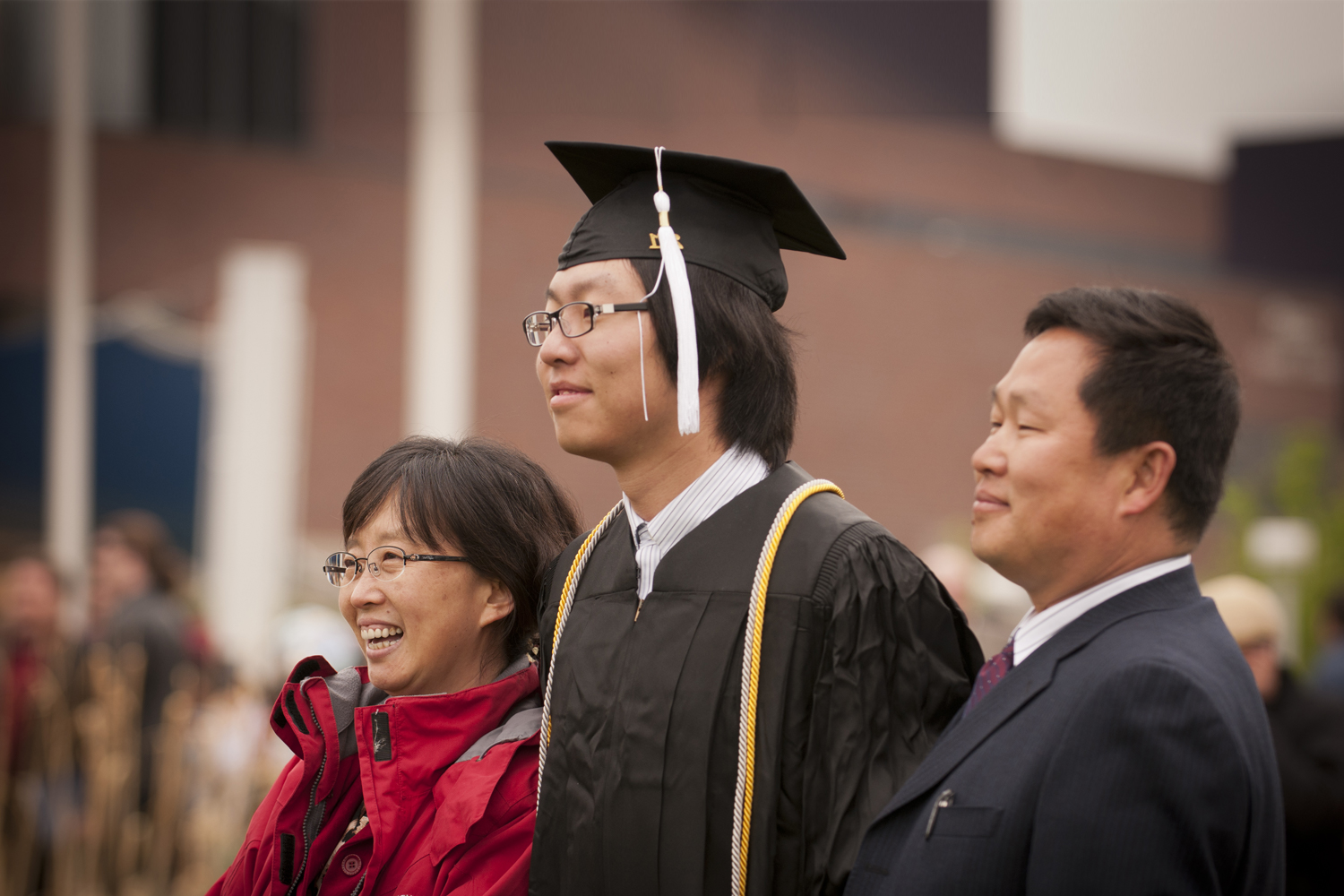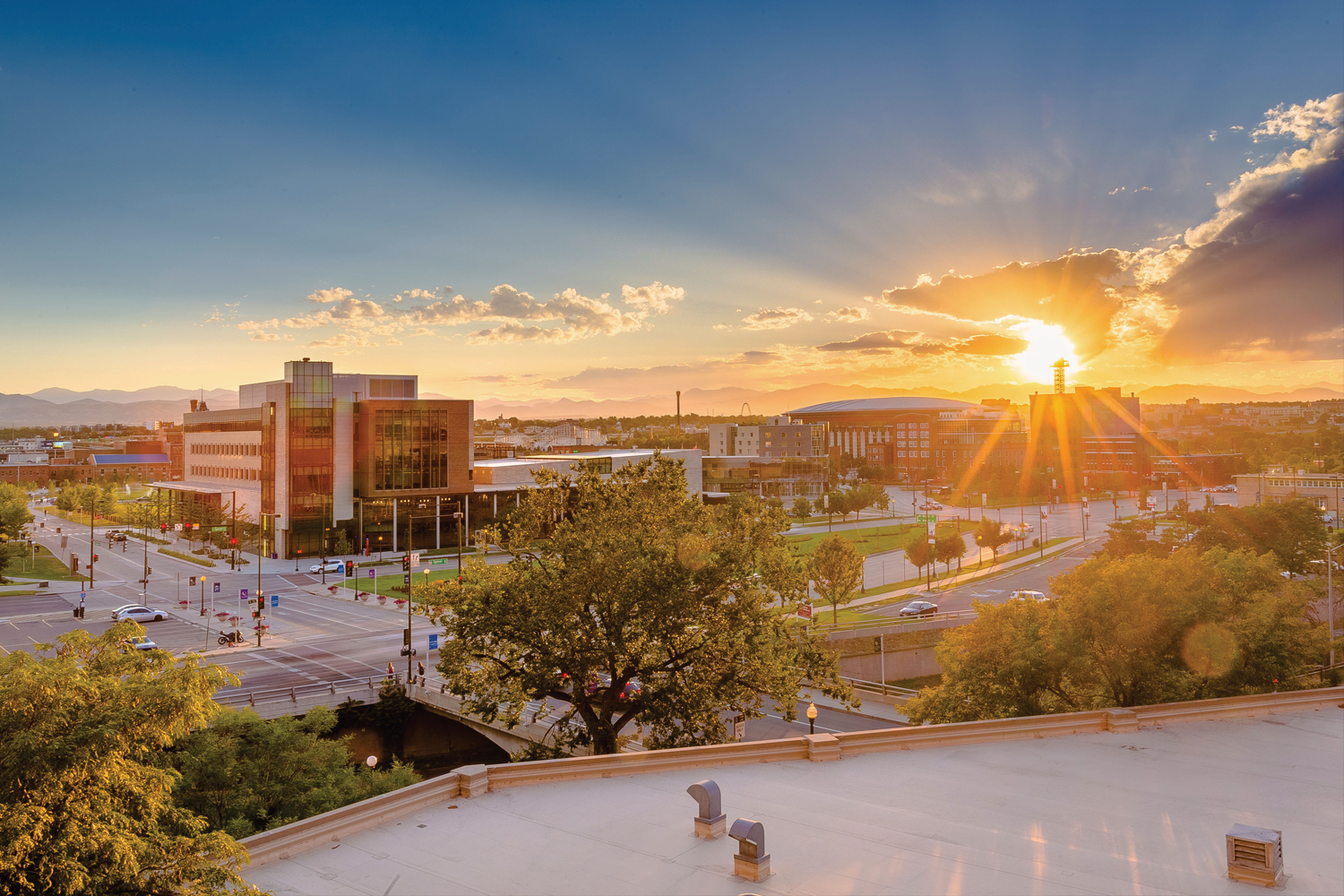International Delegation Focuses on Energy & Education
IIE-Education USA Representatives Visit CU Denver
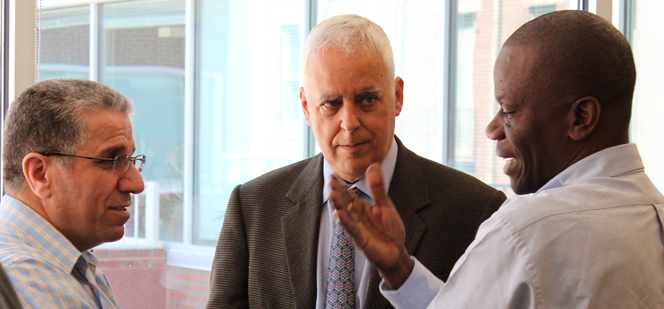
On July 30, the Office of International Affairs, University of Colorado Denver, joined together with deans and faculty from the Business School, College of Engineering and Applied Science, and College of Architecture and Planning to welcome a U.S. State Department delegation of twelve international visitors through IIE/Education USA; their focus was on industry-private sector linkages, innovation, and partnerships.
As a member of StudyColorado, the university had collaborated in supporting a proposal submission to IIE (Institute of International Education) for the delegation visit, competing with other states throughout America. Colorado was awarded the visit, along with a small number of select states.
The group of international university chancellors and professors, top researchers, and government officials came from a range of global regions and countries, including Kazakhstan, Lebanon, Morocco, Nigeria, Tanzania and Jamaica; all had interests in educational program development, establishing partnerships with the University of Colorado Denver, and gaining a better understanding of how CU Denver interfaces with industry relevant to every form of energy usage — sustainable/green energy, solar and wind, oil and gas, and nuclear technology.
“The University of Colorado Denver enjoys a strong reputation worldwide for its faculty research and teaching,”
said John Sunnygard, Executive Director, Office of International Affairs. “Many of the distinguished guests were hand-selected by their country’s U.S. Ambassador to share their work and learn about CU Denver’s specialized academic programs, significant research and industry ties in the Denver area as well as throughout Colorado and the world. We were honored to be selected to welcome the State Department’s guests to Denver.”
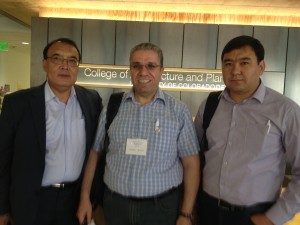 The morning presentation and discussion was conducted by Jim Marchiori, Executive Director, Global Energy Management (GEM) program, School of Business. Marchiori, whose background includes 30 years experience in the human performance side of oil and gas companies, showed the international visitors how GEM’s educational program incorporates a “career ladder” business model that is aligned with the way companies train and promote managers and leaders. The goal of this organizational model of teaching is to help GEM graduates move ahead more quickly in their career growth. With this succession planning and development, during the 18 months of the GEM program and 18 months following, a GEM student/alumnus/a is prepared to climb two steps ahead on his or her career path, with infinite possibilities beyond the initial advancement. Seventy-two percent of GEM graduates get a promotion or new job during or within a year after the GEM program.
The morning presentation and discussion was conducted by Jim Marchiori, Executive Director, Global Energy Management (GEM) program, School of Business. Marchiori, whose background includes 30 years experience in the human performance side of oil and gas companies, showed the international visitors how GEM’s educational program incorporates a “career ladder” business model that is aligned with the way companies train and promote managers and leaders. The goal of this organizational model of teaching is to help GEM graduates move ahead more quickly in their career growth. With this succession planning and development, during the 18 months of the GEM program and 18 months following, a GEM student/alumnus/a is prepared to climb two steps ahead on his or her career path, with infinite possibilities beyond the initial advancement. Seventy-two percent of GEM graduates get a promotion or new job during or within a year after the GEM program.
“It’s important to understand industry development needs and processes, your academic program’s role and where it fits, and how to make explicit links,”
explained Marchiori.
The GEM Program relies heavily on guidance and advisement from its active GEM Advisory Council; the Council is a diverse group with representatives from legal, sales, human resources, and technical areas of their organizations. Companies and organizations such as NREL (National Renewable Energy Laboratory), Colorado Oil and Gas Association, Conoco Phillips, Encana, City of Denver, Consulate Generals of Mexico and of Canada, General Electric, Baker Hughes, Hogan Lovells, and CH2M Hill have been actively involved.
“Know how to position your program using competency models, current knowledge and skills, and connections with foreign-based companies operating in your country,” said Marchiori. He further explained that these companies often provide workforce development for the country. “Work with a partner university to offer a joint degree. The international faculty and the faculty from your country can development content applicable to your country’s energy development and workforce planning.”
The GEM program focuses on training leaders to manage within the energy industry; the average student age is 34 years old. GEM is an 18-month program with January and July cohorts. Fellow classmates must have a minimum of five years’ experience in the energy industry, with some exceptions. If a GEM program is conducted in another country, the classroom schedule can be adapted for the cultural system within that country.
Many enrollees are at a mid-career point and are planning for advancement in their current company. GEM is a hybrid program that combines several weekends of in-person classes on the CU Denver campus, where students first establish a working relationship with fellow classmates and professors, with another portion of the class time that is spent online — these studies can take place from anywhere in the world.
The Q & A session brought up lively discussions in answer to questions such as “how does GEM find industry partners?” and “what is the role of the business partners and the advisory board in developing curriculum?”
A catered lunch followed the morning session, where the delegation met the dean of the College of Engineering and Applied Science, the interim dean of the Business School, faculty from both colleges and from the Center for International Business Education and Research, the associate dean of the College of Architecture and Planning, and members of the Office of International Affairs.
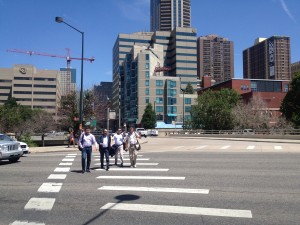 The afternoon began with an informative tour of the College of Architecture and Planning led by CAP’s associate dean, Michael Jenson. The international group visited CAP’s gallery space and its seventh floor design studios, where the visitors stopped often to photograph the scenic views of downtown Denver, the CU Denver campus, and the beautiful Rocky Mountains.
The afternoon began with an informative tour of the College of Architecture and Planning led by CAP’s associate dean, Michael Jenson. The international group visited CAP’s gallery space and its seventh floor design studios, where the visitors stopped often to photograph the scenic views of downtown Denver, the CU Denver campus, and the beautiful Rocky Mountains.
After a general tour of campus, the afternoon’s presentation session and Q & A was hosted by Stephen D. Gedney, Professor and Chair, Department of Electrical Engineering (CEAS), and faculty from the Department of Electrical Engineering: Fernando Fernando Mancilla-David, PhD, Associate Professor; Yiming (Jerry) Deng, PhD, Assistant Professor, Jaedo Park; and Jae-Do Park, PhD, Assistant Professor.
“Most CU Denver Electrical Engineering courses have a laboratory component. CU Denver Electrical Engineering students have the opportunity to intern at facilities such as NIST (National Institute of Standards), NREL (National Renewable Energy Laboratory) as well as many other companies in the Denver Tech Center area, which is the fastest growing tech center in North America,”
said Gedney.
He explained that all senior students in EE participate in a two-semester capstone design project, where they identify a problem, and then identify a technical solution which they design, prototype and demonstrate.
Gedney gave an overview of current research programs by Electrical Engineering faculty at CU Denver, ranging from biomedical imaging, communications and controls, electromagnetics, and embedded systems. He highlighted the research of specific faculty, such as: Prof. Tim Lei’s research in biomedical photonics, where he is introducing new imaging methods to combat kidney disease, Prof. Mark Golkowski’s research in electromagnetic wave propagation in the ionosphere and magnetosphere, Dr. Yiming Deng’s research in high resolution electromagnetic microscopy, 3D mass spectroscopy for diagnosing liver disease, or sub-surface electromagnetic sensing for oil and gas exploration, Prof. Jaedo Park’s research on energy harvesting or DC power systems, and Prof. Dan Connors’ research on embedded systems and vision algorithms for autonomous tracking and navigation.
Prof. Fernando Mancilla-David gave a presentation on his research in the field of renewable energy systems.
The presentations stimulated a number of questions from the international visitors, especially those from Kazakhstan, and Mancilla-David’s presentation about renewable energy systems drew particular interest from the Tanzanian guest. Mancilla is engaged in collaborations with NREL centers for scientific research in France and Spain. In investigating how to develop more efficient, cost-effective models for capturing wind power, he additionally described the alpine windmill that he and his students built in Colorado’s Rocky Mountains.
The day’s culminating wrap-up session sharpened focus on how to customize global partnerships with the University of Colorado Denver | Anschutz Medical Campus, presented by John Sunnygard. Examples included the university’s “3+1+1” program with Northeast Forestry University China; the dual-degree program Master’s of Landscape Architecture with Tongji University; and pathways programs that offer preparatory curriculum to include an English language program with CU Denver’s ESL Academy.
The International College Beijing (ICB), a uniquely designed program between the University of Colorado Denver and China Agricultural University, was also described. ICB was the first joint program of its kind approved by the Chinese Ministry of Higher Education, and it celebrated its 20th year anniversary in 2014. ICB students whose GPA is an average of 3.5, earn their undergraduate degrees in economics or communication from the University of Colorado Denver on either the Denver or Beijing campus. They have continued on into graduate schools at Boston University, George Washington University, Lehigh University, London School of Economics, Rutgers University, and the University of Colorado Denver.
Several representatives expressed a keen interest in working with the University of Colorado Denver, and next-step discussions ensued.
Sunnygard again expressed appreciation for the visitors’ time and interest.
“We have gained new opportunities to establish important partnerships in different areas of the world that may be of great future benefit to your universities and to the University of Colorado Denver.”
LEARN MORE
Office of International Affairs
international.ucdenver.edu
ESL Academy
ESL.ucdenver.edu
College of Architecture and Planning
ucdenver.edu/CAP
Business School
ucdenver.edu/business
College of Engineering and Applied Science
ucdenver.edu/engineering
UPDATES
International College Beijing
-
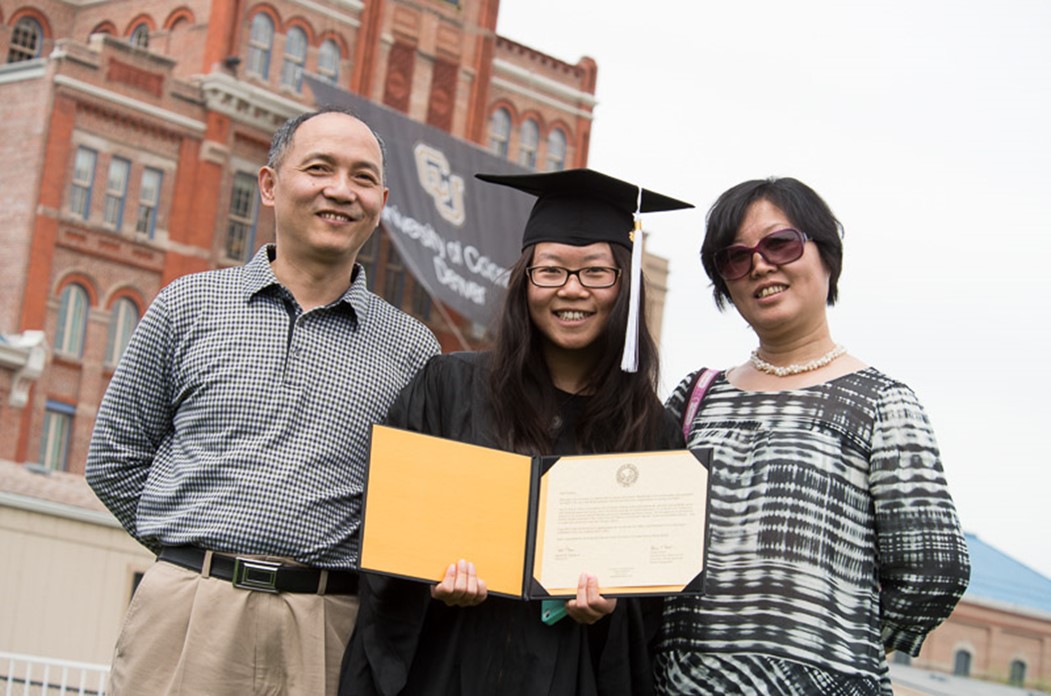
ICB Graduate Fellowship Provides Support
Oct 4, 2021The scholarship, which was launched eight years ago, provides $5,000 annually to an outstanding ICB student who chooses to pursue graduate studies at the University of Colorado Denver. A wide range of graduate programs are available, including applied mathematics, accounting, finance, risk management, public affairs, communications, economics, business, biostatistics, clinical science, and many other degree programs.Full story -

Personalized Attention
Sep 21, 2021Questions were answered, academic guidance was provided, and helpful facts were shared as CU Denver faculty and advisors met with ICB students who had recently arrived in Denver. The students gained a better understanding of certificate program options such as health communication and mediation. They also found out more about communication pathways , including global and intercultural communication.Full story




